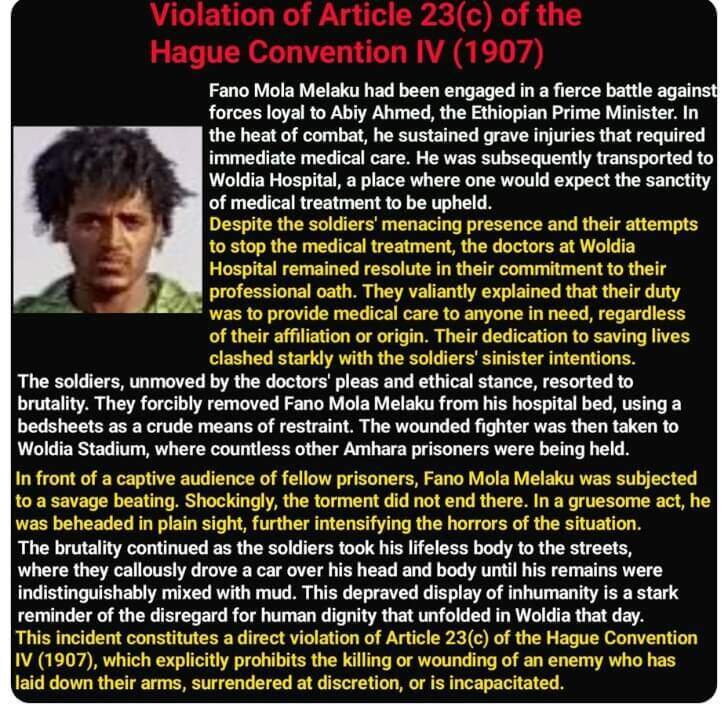
Fano Mola Melaku had been engaged in a fierce battle against forces loyal to Abiy Ahmed, the Ethiopian Prime Minister. In the heat of combat, he was captured and sustained grave injuries that required immediate medical care. He was subsequently transported to Woldia Hospital, a place where one would expect the sanctity of medical treatment to be upheld.
As doctors worked tirelessly to save Fano Mola Melaku’s life, a horrifying interruption occurred. A group of Ethiopian soldiers stormed into the hospital, their voices resonating with disdain for the wounded Amhara fighter.
Despite the soldiers’ menacing presence and their attempts to stop the medical treatment, the doctors at Woldia Hospital remained resolute in their commitment to their professional oath. They valiantly explained that their duty was to provide medical care to anyone in need, regardless of their affiliation or origin. Their dedication to saving lives clashed starkly with the soldiers’ sinister intentions.
The soldiers, unmoved by the doctors’ pleas and ethical stance, resorted to brutality. They forcibly removed Fano Mola Melaku from his hospital bed, using a bedsheets as a crude means of restraint. The wounded fighter was then taken to Woldia Stadium, where countless other Amhara prisoners were being held.
In front of a captive audience of fellow prisoners, Fano Mola Melaku was subjected to a savage beating. Shockingly, the torment did not end there. In a gruesome act, he was beheaded in plain sight, further intensifying the horrors of the situation.
The brutality continued as the soldiers took his lifeless body to the streets, where they callously drove a car over his head and body until his remains were indistinguishably mixed with mud. This depraved display of inhumanity is a stark reminder of the disregard for human dignity that unfolded in Woldia that day.
Fano Mola Melaku’s family, unaware of the horrors their loved one had endured, received his lifeless body covered in a blood-stained bedsheet, along with a stern warning not to uncover it. Overwhelmed by grief and curiosity, some family members could not resist and unveiled the gruesome truth—a piece of human flesh mixed with mud.
This incident constitutes a direct violation of Article 23(c) of the Hague Convention IV (1907), which explicitly prohibits the killing or wounding of an enemy who has laid down their arms, surrendered at discretion, or is incapacitated. The silence of the international community in the face of such atrocities is concerning and raises questions about accountability.
The killing of Fano Mola Melaku at Woldia Hospital is a grim reminder of the atrocities being committed in Ethiopia’s ongoing conflict. It serves as a call for the world to break its silence and demand justice for the victims of this brutal violence. The Ethiopian government must be held accountable.
ጉድ ስሙልኝ pic.twitter.com/Pn7UE7evdm
— Arkani Fano (@Abby70435267) August 20, 2023
#WarOnAmhara #AmharaGenocide #FreeMeskeremAbera #FreeAmharaDetainees

















Beseferut kuna, mesefer aykere new. A true and gallant soldier. May his soul rest with all the other Fanno’s that lost their lives defending their right to freedom and existence!! His legendary should be celebrated, his name should be written in the eternal book of Ethiopian heroes and a statue honoring his sacrifices be erected. Victory to the Fanno men and women!!!!